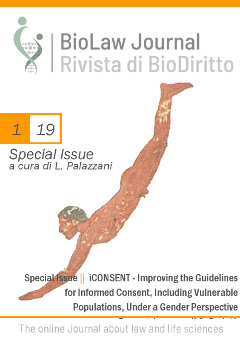Informed consent, experimentation and emerging ethical problems
DOI:
https://doi.org/10.15168/2284-4503-397Parole chiave:
Bioethics, experimentation, informed consent, personalization, technological innovationAbstract
Obtaining informed consent for experimentation takes on a central ethical role. This article analyses, on the basis of the historical origins of informed consent, its present role in bioethics and discusses the main ethical theories on the topic, in a pluralistic philosophical context. The author underlines the reason why informed consent should not be a detailed technical and exhaustive description of a clinical study with the exclusive aim to defend the investigators rather than protect the subjects who have been recruited. The article identifies the main ethical requirements of informed consent from the side of the researcher and of the participant, underlining the emerging ethical issues (dynamic informed consent; personalization; technological innovation; comprehension verification; physician's training in communication; health literacy for participants) and the emerging challenges (broad and flexible consent; enhanced consent; shared consent).##submission.downloads##
Pubblicato
2019-07-10
Come citare
1.
Palazzani L. Informed consent, experimentation and emerging ethical problems. BioLaw [Internet]. 10 luglio 2019 [citato 5 marzo 2026];(1S):11-22. Disponibile su: https://teseo.unitn.it/biolaw/article/view/1366





